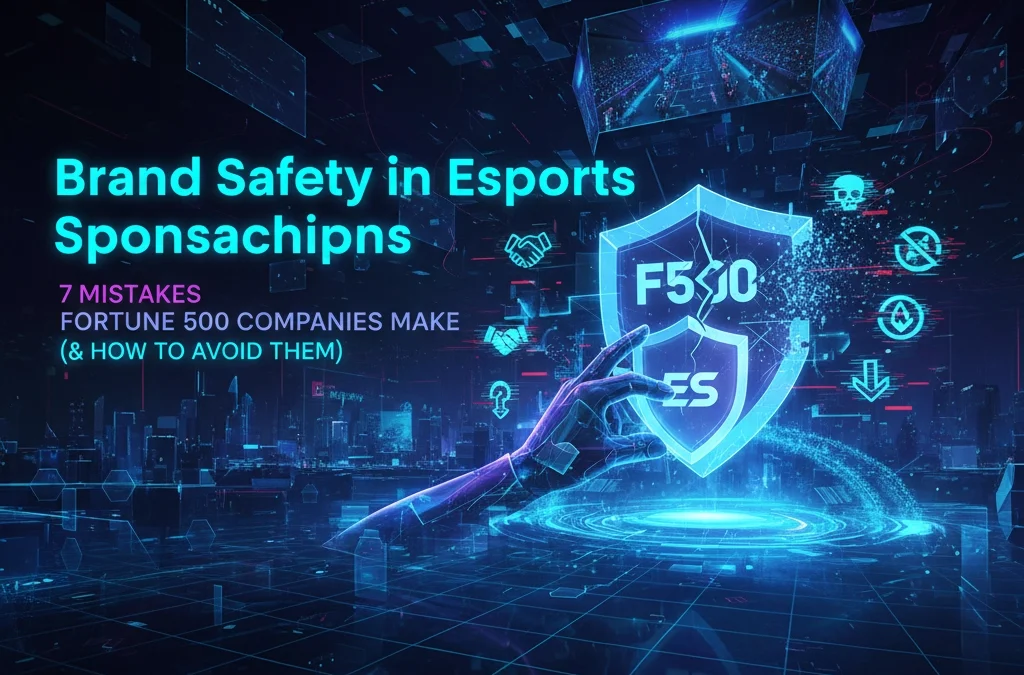The esports industry represents a $1.8 billion opportunity that's impossible for Fortune 500 companies to ignore. Yet while the potential for reaching younger demographics and expanding brand presence is tremendous, the brand safety landscape in esports presents unique challenges that traditional sports sponsorships simply don't face.
Many major corporations enter this space unprepared, making critical mistakes that not only waste significant marketing investments but can actively damage their reputation. The stakes couldn't be higher: a single misstep in esports sponsorships can generate viral negative publicity that spreads across social media faster than any traditional PR crisis.
Understanding these pitfalls isn't just about risk management; it's about unlocking the full potential of authentic esports partnerships that drive measurable business results while maintaining the brand integrity your shareholders demand.
The High-Stakes Reality of Esports Brand Safety
Unlike traditional sports, esports operates in a digital-first environment where controversies can explode across multiple platforms simultaneously. The most prominent factor affecting brand image in sponsorships is the event-sponsor fit, meaning sponsors must carefully evaluate every partnership to ensure their sponsorship activities are perceived positively by their target audiences.
The gaming industry faces ongoing challenges with toxic behavior, illegal gambling, match-fixing, and other disreputable activities that can instantly reflect poorly on associated brands. For Fortune 500 companies with decades of carefully cultivated brand equity, these risks demand sophisticated mitigation strategies.
Mistake #1: Underestimating the Toxic Behavior Landscape
The biggest brand safety risk in esports sponsorships involves toxic behavior within gaming communities. This includes foul language, anti-social behavior, sexism, harassment, and discrimination that can quickly become associated with your brand.
Since esports remains a male-dominated industry, women often experience harassment and discrimination. When these incidents occur during sponsored events, negative news spreads rapidly across social media, potentially damaging brand reputation for months or years.
Strategic Solution: Conduct comprehensive due diligence on potential esports partners, including their community management practices, code of conduct enforcement, and historical handling of toxic behavior incidents. Establish clear contractual requirements for maintaining positive community standards, with specific penalties for violations.
Mistake #2: Overlooking Gambling and Match-Fixing Associations
Illegal gambling sites pose serious threats to the entire esports ecosystem, often lacking security measures to prevent minors from gambling or users from banned countries from participating. Match-fixing scandals, where teams deliberately alter results to benefit from gambling, directly connect to these gambling issues and can devastate brand reputation.
For Fortune 500 companies, any association with gambling controversies: even indirect ones: can trigger regulatory scrutiny, shareholder concerns, and consumer boycotts.
Strategic Solution: Implement rigorous vetting processes for esports organizations, investigating any historical connections to gambling controversies or match-fixing scandals. Include specific contractual clauses allowing for immediate contract termination if gambling-related issues arise, protecting your brand from ongoing association with compromised partners.
Mistake #3: Limiting Activation to Logo Placement Only
Many Fortune 500 companies treat esports sponsorships like traditional advertising, focusing solely on logo placements and naming rights without leveraging the unique engagement opportunities esports provides. This approach fails to create meaningful connections with esports audiences and wastes the sponsorship investment.
Esports fans are digitally native and expect interactive, authentic experiences. They can immediately identify: and reject: superficial marketing attempts that don't add genuine value to their gaming experience.
Strategic Solution: Develop comprehensive activation strategies beyond logo placement, including in-game trigger promotions, exclusive fan experiences, branded product collaborations, and interactive content that creates direct consumer engagement opportunities. Consider educational partnerships that demonstrate genuine commitment to the esports ecosystem.
Mistake #4: Prioritizing Short-Term Impressions Over Long-Term Relationships
Companies often prioritize immediate visibility metrics over building authentic, long-term connections with esports communities. This short-sighted approach misses the opportunity to develop genuine brand affinity within passionate gaming audiences who highly value authentic engagement over superficial marketing tactics.
Esports communities are built on shared passion and loyalty. Brands that demonstrate consistent, meaningful support over time earn significantly higher trust and advocacy than those pursuing quick visibility wins.
Strategic Solution: Develop comprehensive long-term strategies focused on building genuine relationships with esports communities. Recognize that meaningful results take time and maintain consistent engagement, understanding that actions at one event can impact brand perception for years.
Mistake #5: Insufficient Audience and Industry Research
Many corporations enter esports sponsorships without adequately understanding the industry's history, current trends, or future developments. This lack of research leads to messaging that doesn't authentically resonate with gaming audiences and missed opportunities to add meaningful value to the esports ecosystem.
Gaming communities have their own cultural norms, communication styles, and value systems. Brands that fail to understand these nuances often appear tone-deaf or opportunistic, generating negative reactions that can persist across multiple gaming platforms.
Strategic Solution: Invest significant resources in researching the esports industry, understanding gaming culture, and identifying what specific gaming communities value. Partner with experienced esports consultants who can navigate cultural complexities and identify authentic connection opportunities that align with your brand values.
Mistake #6: Ignoring Brand-Industry Fit Considerations
Non-endemic brands face particular challenges in esports sponsorships and are more likely to damage their brand image if they don't carefully consider their industry fit. Companies that don't naturally align with gaming culture may struggle to create authentic connections and face higher risks of negative perception.
However, brands that find genuine connection points: such as technology innovation, education, or career development: can successfully build meaningful relationships within esports communities.
Strategic Solution: Honestly assess your brand's natural fit with gaming culture and adjust your approach accordingly. Focus on finding authentic connection points rather than forcing unnatural associations. Consider educational initiatives or simulation-based partnerships that demonstrate genuine value to the gaming community.
Mistake #7: Lack of Objective Success Measurement
Many Fortune 500 companies fail to establish clear, objective measures of success beyond basic awareness metrics. This makes it impossible to evaluate the true impact of esports sponsorship investments and optimize future campaigns for better results.
Without proper measurement frameworks, companies cannot distinguish between successful partnerships and wasteful spending, leading to either premature abandonment of promising strategies or continued investment in ineffective approaches.
Strategic Solution: Establish comprehensive measurement frameworks that include engagement quality, brand sentiment changes, purchase intent shifts, and actual sales attribution. Set realistic timelines for seeing results, understanding that meaningful brand connections in esports require sustained effort over multiple campaign cycles.
The EsportsPod Advantage: Mitigating Risks While Maximizing Opportunities
At EsportsPod, we've developed comprehensive solutions that address each of these common mistakes while maximizing the tremendous opportunities esports sponsorships offer Fortune 500 companies. Our educational simulation pods provide brand-safe environments where corporate partners can engage with high school students through meaningful, curriculum-aligned experiences.
Our approach eliminates many traditional esports sponsorship risks by focusing on educational partnerships that naturally align with corporate social responsibility initiatives. When Fortune 500 companies partner with EsportsPod, they're not just avoiding potential pitfalls: they're actively contributing to student education and career development in ways that generate genuine positive associations.
Building Brand-Safe Esports Strategies That Deliver Results
Successful esports sponsorships require strategic thinking that acknowledges both tremendous opportunities and unique risks in this dynamic industry. Companies must understand that poorly executed sponsorships can negatively impact brand perception, while well-planned activations can significantly improve brand image among highly engaged gaming audiences.
The key to avoiding these costly mistakes lies in treating esports sponsorships as long-term investments rather than short-term marketing tactics, conducting thorough research on potential partners, and developing authentic engagement strategies that resonate with gaming communities while maintaining appropriate brand safety standards.
Ready to explore how EsportsPod can help your Fortune 500 company navigate esports sponsorships safely while achieving meaningful business results? Our educational simulation partnerships offer unprecedented brand safety combined with authentic engagement opportunities that align with your corporate values and business objectives.




